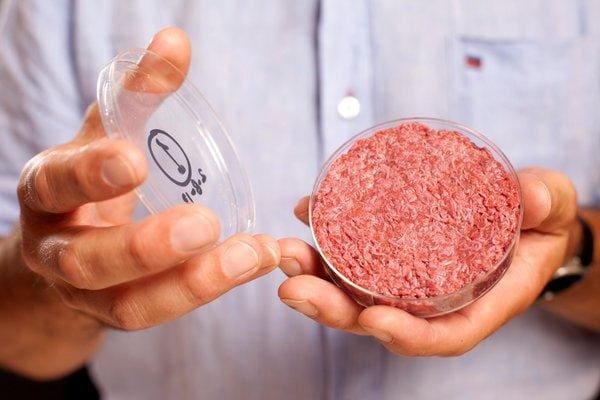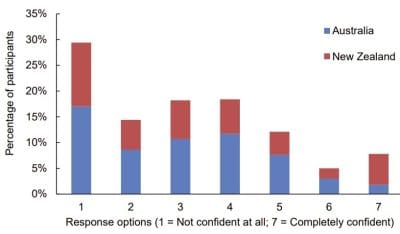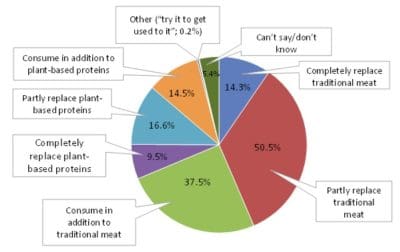
Lab-grown meat burger
MOST Australian consumers would not be confident in the safety of cell-cultured meat if it became available for sale in shops and supermarkets, an important recent survey has shown.
Commissioned by Food Standards Australia New Zealand, the survey looked into consumer attitudes and levels of acceptance in both countries towards cell-based, or lab grown meat products.
Although Australians were significantly more confident in the safety of cell-cultured meat than New Zealanders, both countries generally had low levels of confidence in these food products.

Percentage of participants that selected each response when asked whether they had heard of cell-cultured meat. Click on image for a larger view
Australian consumers’ generally had low levels of awareness of cell-cultured meat, the survey showed. Thirty five percent of survey participants said they had never heard of cell-based or lab grown meat, while another 39pc said they had heard of it, but knew little about it. A further 20pc said they knew something about it, but not enough to explain it to a friend.
The Consumer Insights Tracker survey is an online survey of 1237 Australian and 810 New Zealand consumers aged 18 years or more. It is based on a nationally representative sample using quotas for age, gender and location, measuring consumers’ awareness, safety perceptions and consumption intentions regarding cell-cultured meat.
Low levels of awareness of cell-cultured meat was not surprising, given that cell-cultured meat is currently not available for sale in Australia and New Zealand, the report said.
Displacement of conventional or plant-based meat?
Although 62pc of consumers indicated they are currently not confident in the safety of cell-cultured meat, more than half of consumers (52pc) indicated they were at least open to being persuaded to try it.

Percentage of participants that selected each response when asked whether they were confident in the safety of cell-cultured meat if it became available for sale. Click on image for a larger view
Of those that said they would readily incorporate cell-cultured meat into their diets (23.6pc), just over half said that cell-cultured meat would partly replace traditional meat in their diet (note: only participants who previously indicated that they would include cell-cultured meat in their diet were asked this question).

Percentage of participants that selected each response when asked how they would incorporate cell-cultured meat into their diets (note: participants could select more than one response). Click on image for a larger view
An additional 37pc said they would consider eating cell cultured meat in addition to conventional meat protein, while 14pc said it would completely replace traditional meat.
Significantly, more than 40pc said cell-based meat would either partially or completely replace their consumption of plant-based meat substitutes, or be consumed in addition to plant-based.
Limitations
The survey managers said there were a number of caveats that should be considered when interpreting the results.
 Firstly, results only represented a single snapshot in time, they said. Consumers’ consumption intentions regarding cell-cultured meat could change as they become more familiar with the product.
Firstly, results only represented a single snapshot in time, they said. Consumers’ consumption intentions regarding cell-cultured meat could change as they become more familiar with the product.
Secondly, the survey measured consumers’ behavioural intentions regarding cell-cultured meat, and it is well known that behavioural intentions do not always correspond to actual behaviour at the checkout. However, it was not possible to measure consumers’ actual behaviours regarding cell-cultured meat, given that cell-cultured meat is not currently available for sale in Australia or New Zealand.
Lab grown versus cell-grown
Thirdly, survey managers described cell-cultured meat to participants as “cell-based meat (that is, meat produced from animal cells, sometimes referred to as ‘lab-grown meat’).”
Findings from consumer literature reviews indicated that the term ‘lab-grown meat’ causes people to think that the product is more unsafe (compared to other terminologies). Therefore this likely had an impact on participants’ safety concerns of cell-cultured meat in the survey, they suggested.
“However, given that this terminology is commonly used in the media, it may still provide an accurate snapshot of what consumers’ current safety perceptions are (based on information they have likely been exposed to),” the survey report said.
“Nevertheless, there is evidence that consumer perceptions of cell-cultured meat are highly malleable, depending on the type of information they receive about the product.”
